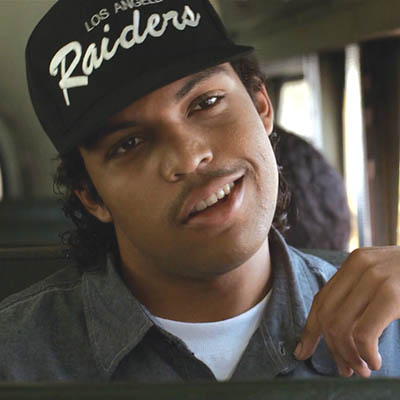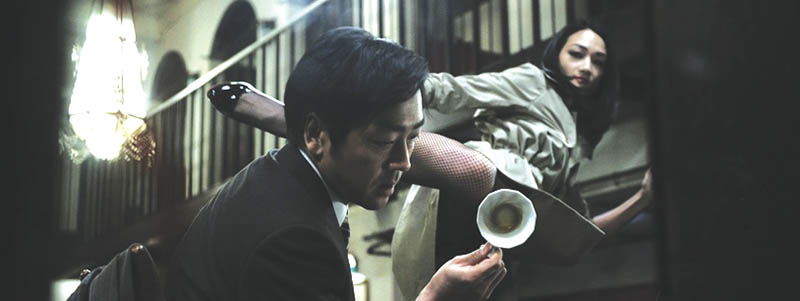LA stories
The hard-knock lives of ‘Tangerine’ and ‘Straight Outta Compton’
Mickey O’Hagan and Kitana Kiki Rodriguez in ‘Tangerine’
Tangerine
Produced by the Duplass Brothers and shot entirely on an iPhone for about $100,000, “Tangerine” is ample proof that an accessible medium is still subordinate to the vision of a savvy filmmaker. Writer-director Sean Baker (“Starlet,” “Prince of Broadway”) has crafted a propulsive, gleefully unapologetic comedy that was, for good reason, the toast of this year’s Sundance Film Festival.
Transgender sex workers Sin-Dee (Kitana Kiki Rodriguez) and Alexandra (Mya Taylor) are best friends who work under Chester (James Ransone, “The Wire”), their pimp and dealer and Sin-Dee’s ostensible boyfriend. The plot is set in motion when Alexandra inadvertently informs Sin-Dee that Chester is sleeping with a white, cisgender prostitute named Dinah (Mickey O’Hagan).
Meanwhile, we meet the amiable Razmik (Karren Karagulian, a veteran of Baker’s films), an Armenian cab driver with an adoring family and a secret fetish for trans hookers. Razmik, his family’s sole breadwinner, fights the soul-deadening experience of driving a cab in LA by keeping company with the local streetwalkers in between chauffeuring eccentric fares (including Holdenville native Clu Gulager in a brief cameo).
The paths of Razmik, Alexandra, Sin-Dee, and Chester cross in ever more personal ways as they struggle to acknowledge their inherent differences amid often-unenviable circumstances. The film’s optimism emerges when the characters are forced to unite as ugly realities puncture their rarefied worlds.
“Tangerine” is a revelation, and the use of iPhones is just one reason. The footage is certainly cinematic (achieved with the use of a special lens attachment and Steadicam hand mounts). The downtown LA streets take on a phosphorescent sheen of hyper saturation; the quasi-documentary aesthetic bristles. It’s as if Lars von Trier (“Nymphomaniac”) and Gregg Araki (“The Doom Generation”) made a trans comedy with all the explicitness, unfiltered immediacy and absurdity one might expect from them—and from life itself.
That sense is amplified by the performances Baker captures from a largely non-professional cast. Rodriguez and Taylor in particular aren’t just ostentatious personalities; they embody deftly drawn characters. Their patois is genuine (even when Sin-Dee gets so pissed off she becomes indecipherable), and their performances feel completely unaffected. Conversely, Karagulian brings a stoic depth to Razmik. Baker’s narrative has more than a few twists, but the characters and their stories are amazingly relatable. As a comedy, it connects with pleasing regularity, becoming almost farcical (in the best sense) when the concentric circles we’ve watched these people orbit finally meet in the middle.
Weird, funny, vibrant, chaotic, edgy—your mileage may vary, depending on your appetite for the subject matter. But any way you slice it, “Tangerine” is a game-changer.

Straight Outta Compton
Movies are inherently limited in their capacity to give biographical detail. There’s a built-in sense of the glossed-over—the artifice of adapting real life with the tools of cinematic fiction. These are the pitfalls F. Gary Gray’s “Straight Outta Compton” can’t avoid.
That’s not to say it’s a lesser film than the critically lauded “Ray,” or “Walk the Line,” or any other by-the-numbers biopic. I enjoyed “Compton” much more than either of those, if only for the fact that Gray imparts a rebellious spirit to the film that rings true amidst our present struggles with racially skewed police brutality. The film’s reverence for the rise and fall of legendary gangster rap pioneers N.W.A. feels unerringly honest. But it’s definitely not the whole truth—by design, it really can’t be.
Before teaming up with Ice Cube in 1995 for quintessential cult stoner dramedy “Friday,” Gray directed music videos for Cube and Dr. Dre as their solo careers began to take off in tandem. That Gray would bring N.W.A.’s story to the big screen seems as organic a choice as one could imagine. That familial sense bleeds into the casting of Cube’s son O’Shea Jackson Jr. to play the young, pre-“Are We There Yet?” rapper—when his stoic glare and taciturn demeanor still felt threatening.
N.W.A.’s rich story is the American dream in action: five artists rising out of lower class turbulence in a city so disregarded in the ‘80s that it was literally left off maps of Greater LA. With screenwriters Jonathan Herman and Andrea Berloff, Gray captures the electric excitement and humor of their budding success, the drama as they’re scattered to the winds of solo stardom, the realities of living in South Central—where just “standing while black” is sufficient cause for police harassment (the catalyst for their biggest hit)—and the ties that bring them back together when one of their own falls.
Though it isn’t groundbreaking (not in the way N.W.A.’s eponymous album was), “Compton” is satisfying, often moving, and stylishly executed. The cast is uniformly excellent, with Jason Mitchell (as Easy-E) and Corey Hawkins (as Dre) among the standouts, and Paul Giamatti’s reliably great presence as Jerry Heller, the controversial music promoter both lauded for N.W.A.’s discovery and condemned for their dissolution. His story alone could have made its own film—any of them could have.
If you love N.W.A., you’ll see this. Even if you don’t, you should see it. When “Straight Outta Compton” is hitting on all cylinders, it’s an exciting and thoughtful portrait of one of the 20th Century’s most important bands.
“Straight Outta Compton” is showing now in Tulsa theaters.

Bi-Weekly Bits
The venerable, Austin-born Alamo Drafthouse Cinema is the brainchild of founding father Tim League. With its eclectic selections, expert exhibition, ready access to good food and strong drink and upfront ethos concerning audience etiquette (they’ll kick you out for texting), the Drafthouse has garnered such acclaim that the brand eventually expanded into film distribution.
The movies curated under the Drafthouse banner run the gamut from delightfully weird and thought provoking to utterly indescribable. Circle Cinema’s ongoing—and very cool—monthly Drafthouse Film Series returns this month with the deeply bent Japanese dramedy, “R100.”
Nao Ōmori (“Ichi the Killer”) plays Katayama, a typical, stuck-in-a-rut Tokyo salary man. The pressures of his humdrum existence compel Katayama to sign an unbreakable yearlong contract with a BDSM “club” that sends leather-clad dominatrices to assault and humiliate him at completely random times (and places) throughout the day. At first, Katayama is pleased with the arrangement. But when the escalating daily visits from the likes of Whip Queen, Saliva Queen and, um, Gobble Queen begin to threaten his family, Katayama must protect them, no matter the consequences.
“R100” shows August 21 and 22 at 10 p.m. The bar, catered by Chimera Cafe, begins serving at 9 p.m. A video introduction from League precedes the screenings, which are hosted by local filmmaker and movie nerd Josh Emanuel. For more information visit circlecinema.com.
For more reviews from Joe, read his reviews of 'Dark Places' and 'The People Under the Stairs.'


.jpg)
.jpg)
